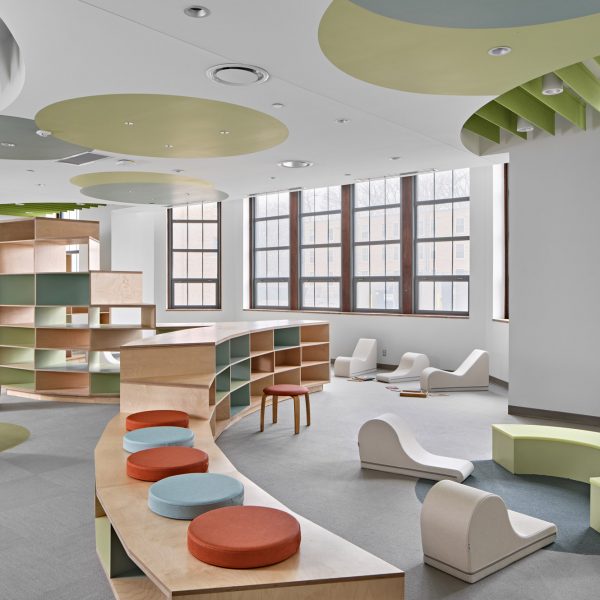[ad_1]
PLY+ and MPR Arquitectos have transformed a building at a former Catholic college into the School at Marygrove Elementary, filling it with colours and shapes that help spark “experimentation and exploration” among children.
Located in northwest Detroit, the building is part of the School at Marygrove, a new educational institution that will eventually serve students in kindergarten through 12th grade (K-12). The curriculum has a special focus on engineering and social justice.
The school occupies the site of a former religious college, Marygrove College, that closed in 2019. The campus – which is listed on the US National Register of Historic Places – is now owned and managed by a nonprofit organization, the Marygrove Conservancy.
Several buildings on the 53-acre (21-hectare) campus are being converted into facilities for the School at Marygrove.
This project involved transforming a brick-faced, concrete building that first opened in 1941 into a public elementary school for children in kindergarten through fifth grade.
The design was led by PLY+, a studio based in Ann Arbor, Michigan, and MPR Arquitectos, which is based in Ann Arbor and Murcia, Spain.
Both firms are led by professors at the Taubman College of Architecture and Urban Planning at the University of Michigan.
The architects aimed to preserve original features in the 65,000-square-foot (6,039-square-metre) building while integrating a host of new elements.
The goal was to “establish a foundational, collaborative educational environment” while preserving the historic components.
The building’s exterior was kept intact, the only change being the addition of an accessible entrance.
Within the building, the team modified rooms and added new finishes and plywood millwork. The decor was carefully selected, and special details – such as visually dynamic ceiling baffles – were incorporated.
The building’s original layout was mostly retained, as the double-loaded corridor layout was deemed historically significant and kept in place.
The corridor received new storage nooks with spots for bags, coats and shoes. In the classrooms, the team inserted counters, sinks, benches, chalkboards and storage space.
“Custom millwork elements provide design flexibility without impinging on historic elements,” the team said.
The project also called for the creation of maker spaces, reading rooms, a media centre and a restorative justice centre. An existing gymnasium was renovated.
Throughout the facility, the team used a mix of soft and bold colours, ranging from bright peach to pale yellow-green.
The palette was informed by historic hues and the desire to introduce colours that signal “the new use of the building and the new model of pedagogy being fostered”, the team said.
“Colour and form play an important role in establishing unique identities for individual classrooms and signal the vibrancy and joy of collaborative learning,” the team added.
Overall, the design is meant to speak to its young users.
“The design engages children’s sense of curiosity and encourages experimentation and exploration,” the team said.
The project was a collaboration between Detroit Public Schools Community District, which operates the school, and the University of Michigan’s School of Education.
Other school projects include an athletic centre at an Oregon school that features trellises laced with climbing vines and a boarding school in southern California that has buildings with jagged rooflines.
The photography is by Jason Keen.
Project credits:
Architect: PLY+ and MPR Arquitectos
Ply+ team: Craig Borum, Jen Maigret, Andrew Wolking, Yusi Zha, Olaia Chivite Amigo, Yibo Jiao, Masataka Yoshikawa
MPR Arquitectos team: Ana Morcillo-Pallares, Jon Rule
Architect of record: Integrated Design Solutions
Client: Marygrove Conservancy
Collaborators: Detroit Public Schools, University of Michigan School of Education
[ad_2]

